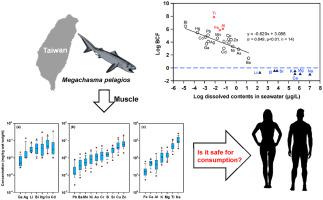Environmental Pollution ( IF 7.6 ) Pub Date : 2020-11-26 , DOI: 10.1016/j.envpol.2020.116161 Yun-Ru Ju , Chih-Feng Chen , Chiu-Wen Chen , Ming-Huang Wang , Shoou-Jeng Joung , Chi-Ju Yu , Kwang-Ming Liu , Wen-Pei Tsai , Shang Yin Vanson Liu , Cheng-Di Dong

|
Focusing on 27 rare filter-feeding megamouth sharks (Megachasma pelagios) captured as a by-catch of drift gillnet fishery in the Pacific Ocean to the east of Taiwan, this study analyzes the concentrations of 24 elements in their muscle, discusses the bioaccumulation of each element and the correlation between different elements, and assesses the potential health risks of consuming megamouth shark muscle. Among the 24 elements, mean concentrations of Ga, Ag, Li, Bi, Hg, Co, and Cd were relatively low ranging from 10−3 to 10−1 mg/kg, those of Pb, Ba, Mn, Ni, As, Cr, B, Sr, Cu, and Zn ranged from 10−1–101 mg/kg, and those of Fe, Ca, Al, K, Mg, Ti, and Na were relatively high ranging from 101 to 103 mg/kg. The toxic element content index was most significantly correlated with the concentration of Cu. Hence, this study recommends that the concentration of Cu could be used as an indicator of metal accumulation in megamouth shark muscle. The log bioconcentration factor (BCF) ranged from less than 0 to 7.85 in shark muscle. For elements with a concentration of less than 100 μg/L in seawater, the log BCF was inversely proportional to their concentration in seawater. According to the correlation analysis, the accumulation of elements in muscle of megamouth sharks is primarily affected by the concentrations of dissolved elements in seawater, except that the accumulation of Hg, As, Cu, Ti, Al, and Fe appears to be mainly affected by feeding behaviors. The assessment of the health risk of consuming megamouth shark muscle showed that its total hazard index was greater than 1. This suggests that the long-term or high-frequency consumption of megamouth shark muscle may cause health hazards due to the accumulation of trace elements, particularly those with a large contribution of health risk, including As, Hg, and Cu.











































 京公网安备 11010802027423号
京公网安备 11010802027423号